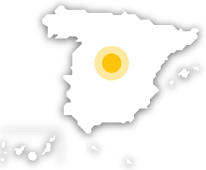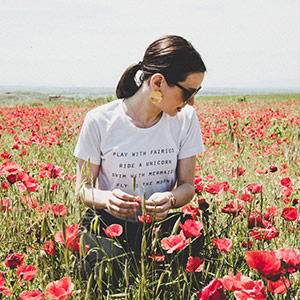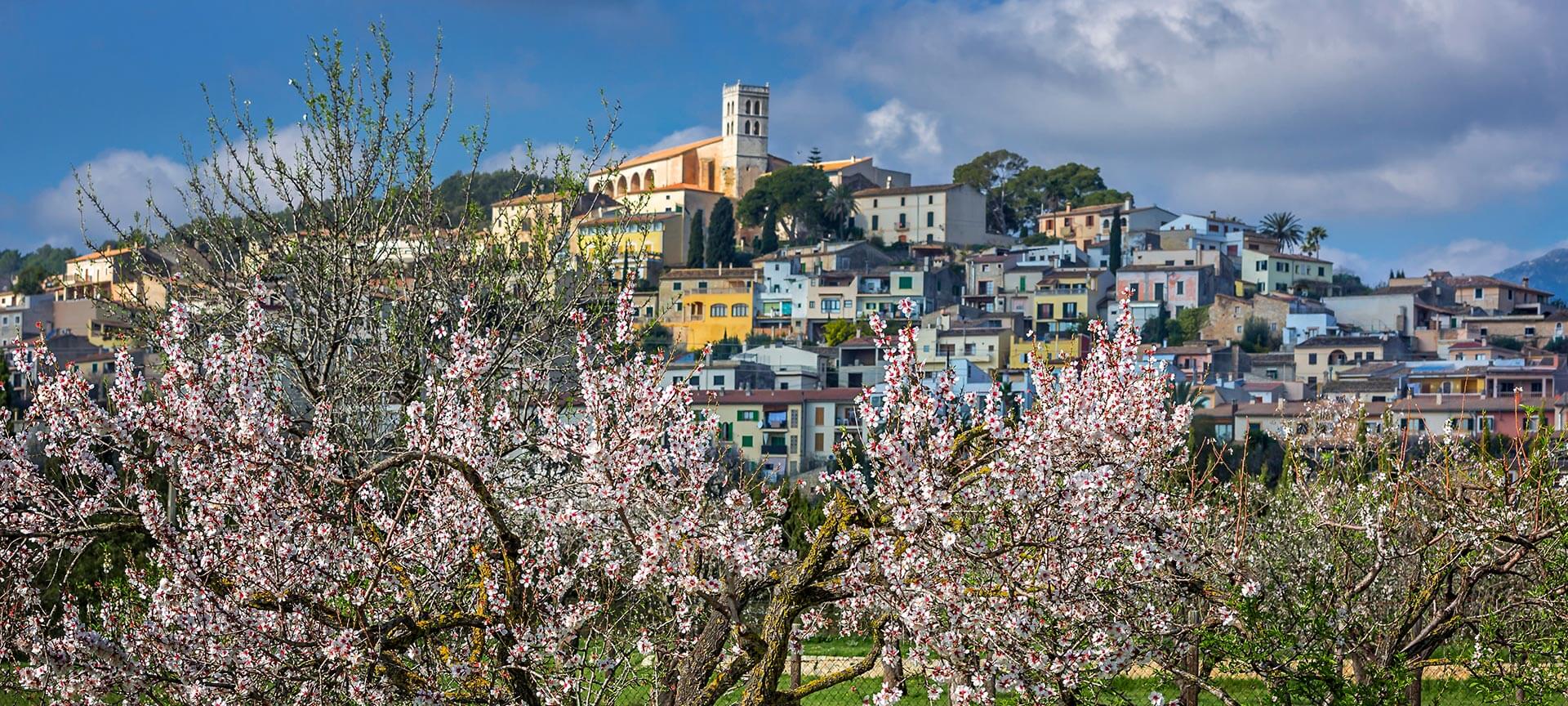
12 rural getaways to enjoy every month of the year
Spain is full of extraordinary places where you can enjoy nature and the peace of the countryside all year round. Each season offers a different perspective, not only in terms of the landscape, but also in the activity in the villages and the surrounding area. Here are some of our recommendations for a rural getaway any month of the year.
Debe activar Javascript para poder utilizar este servicio
-
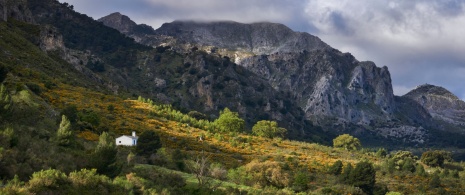
12January: Sierra de las Nieves National Park (Malaga)
Winter can be a good time for hiking in the Sierra de las Nieves National Park. It is located in the inner part of the province of Malaga, close to the Costa del Sol, and although it rains and snows more frequently during these months, the temperatures tend not to drop too much. This is the time to enjoy its greenest and wettest landscape, with the peaks capped in white. Picture postcard-perfect walks to relax, followed by a leisurely visit to one of the pretty villages in the area, such as Ronda, Istán or Tolox.
-
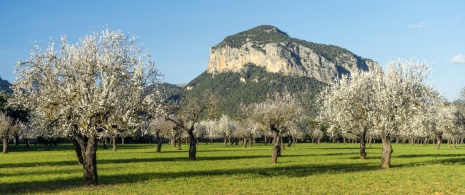
12February: almond trees in blossom in Majorca
From February onwards, a white other than snow can be seen: the blossoming of the almond trees. Majorca is famous for its numerous fields of these fruit trees which, without even waiting for spring, offer a beautiful spectacle of colour from the beginning of February until mid-March. The east of the island and the El Raiguer region, at the foot of the Tramuntana mountain range, are ideal areas to see almond trees in bloom. A trip to towns such as Santa María del Camí, Binissalem, Inca, Selva, Manacor, Sant Llorenç des Cardassar, Llucmajor or Son Servera (where the Almond Blossom Fair is held), will give you plenty of opportunities to take unforgettable photos.
-
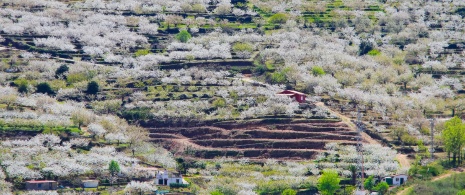
12March: cherry trees in bloom in the Jerte Valley (Cáceres)
During the month of March, more than one and a half million blossoming cherry trees create an enchanting natural landscape in the Jerte Valley, looking like something out of a dream. This is a festival of nature with no specific date – depending on the weather conditions, it takes place between mid-March and around 10 April. Flowering usually lasts 10 to 15 days and takes place progressively: The cherry trees at lower altitudes bloom first, and as the days go by, the trees at higher altitudes open their blossoms. The towns in this region of Cáceres also celebrate the Cherry Blossom Festival, with food tastings, markets and numerous traditional activities.
-
12April: bear watching in Somiedo and Muniellos (Asturias)
In April the bears emerge from their winter slumber, and the chances of seeing them in their natural habitat increase. Asturias is one of the regions that still remains a refuge for these wild animals. Brown bear watching in the areas of Somiedo, Muniellos or Fuentes del Narcea, Degaña and Ibias Natural Park is an exciting ecotourism experience. The guided walks are family-friendly, complete with observation equipment (binoculars and telescopes). Accompanied by expert nature guides, you not only learn about the behaviour and biology of bears, but also how to interpret their tracks and traces.
-
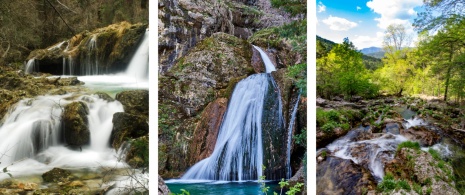
12May: the source of the Mundo River (Albacete)
Rivers in springtime are a guaranteed delight. The waterfall at the source of the Mundo River, cascading more than 80 metres, is one of the most beautiful in Spain. It is located 8 kilometres from the town of Riópar, in the province of Albacete, in the Calares del Mundo y de la Sima Natural Park. The water rushes from the Cueva de los Chorros and, in seasons of intense rain, its flow can intensify, forming the famous “Reventón” waterfall. The place to see it from below is easily reached by a marked path. If you want to climb to the mouth of the cave, you will need to book a guided tour.
-
12June: Lobos River Canyon (Soria)
The month of June is an ideal time to visit Lobos River Canyon Natural Park. Spring tends to come late in the province of Soria, where the nature reserve is located, so you can enjoy the whimsical features of its landscape when everything is green, well-watered and in bloom. The different hiking routes in the natural park lead you to its most outstanding spots, such as the Templar Hermitage of San Bartolomé, the Cueva Grande, the Colmenar de los Frailes and the Galiana viewpoint. Afterwards, there's nothing better than a visit to the historic town of El Burgo de Osma (less than 20 kilometres away), to sample its delicious gastronomy and enjoy the popular torreznos de Soria (fried bacon).
-
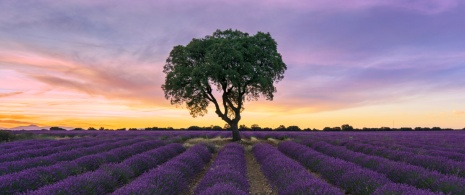
12July: the lavender fields of Brihuega (Guadalajara)
The “Spanish Provence” is in Brihuega, in the province of Guadalajara. Its fields turn a wonderfully intense violet color every July, when the lavender blooms. Seeing them is a truly unique sensory experience that fills you with serenity: The interplay of colours produced by the changing sunlight, the swaying of the flowers in the breeze, the intoxicating aroma... In addition, the streets of the town are decoratedduring the flowering season, and numerous cultural activities take place, such as guided tours of the lavender fields or the concerts of the Lavender Festival.
-
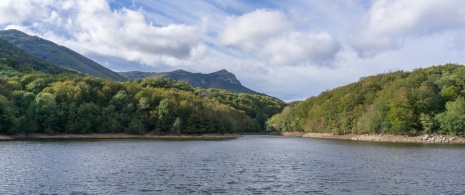
12August: Montseny Natural Park (Barcelona and Girona)
This is one of the Catalan people's favourite places to get away and enjoy nature. It has been declared a Biosphere Reserve and is located approximately 60 kilometres from the city of Barcelona, between the regions of Osona, Vallés Oriental and La Selva. Its forests, lakes, rivers and waterfalls are especially appealing in summer, when taking a dip in its natural pools (gorgs, in Catalan) is the most refreshing plan. Hiking routes through its towns and villages, or discovering the historical heritage of towns such as Viladrau, Montseny, Sant Esteve de Palautordera or Sant Celoni, are also great options.
-
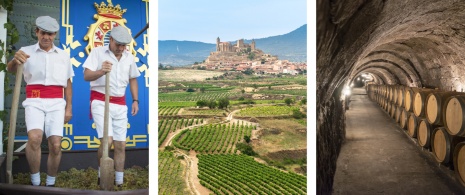
12September: grape harvest on the wine routes
You will find many places in Spain where the month of September is marked on the calendar as the grape harvest: from Jerez de la Frontera to La Rioja, Ribera del Duero and other famous Spanish wine regions. September is a perfect time for wine tourism and experiencing wine routes. The wineries often organise visits and activities in the vineyards to learn first-hand about the grape harvesting and winemaking process. Many towns and villages also hold grape harvest festivals, with the traditional treading of grapes, wine tastings and samplings of typical products.
-
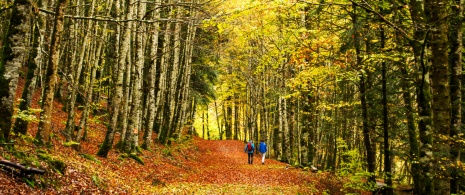
12October: beech groves at the Irati Forest, Navarre
When autumn arrives, the forests gradually transform to offer a stunning symphony of colours. It is a truly magical experience to take a relaxing stroll through the Irati Forest, admiring the nuanced colours of its leaves. This natural space in Navarre is one of the largest and best preserved beech-fir forests in Europe. In addition, its Lizardoia reserve has been declared World Heritage along with other Spanish beech forests. There is a network of marked trails that allow you to explore, and the visitor center offers guided routes. For the cherry on top, visit the nearby town of Ochagavía to see its beautiful Pyrenean architecture.
-
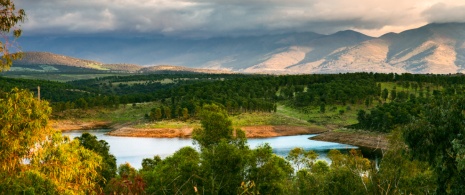
12November: Ambroz Valley (Cáceres)
In November, the Ambroz Valley is a destination for experiencing a “Magical Autumn”. Under this name, and in celebration of the splendour of nature at this time of year, the villages in the area hold a festival of cultural and leisure activities. You will find all kinds of possibilities for enjoying this beautiful spot in Extremadura in a unique way: From mushroom days to guided hiking routes, bicycle rides, concerts, theatre, children's activities and more. That's not to mention, of course, other attractions of the towns in the valley, such as the Jewish quarter of Hervás, the thermal waters of the Baños de Montemayor or the tasty stews of the local cuisine.
-
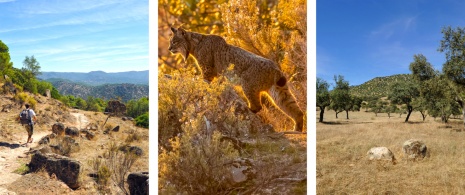
12December: Iberian lynx watching in the Sierra de Andújar (Jaén)
The Sierra de Andújar Natural Park, in Jaén, stands out for the large number of iconic endangered species that find refuge there. In fact, it is the area with the largest number of Iberian lynx in Spain. December and January is the mating season for these felines, so they are more active and the chances of seeing them in their habitat increase. There are companies that organise routes and guided tours with experts for different lengths of time, from half a day to a weekend or several days. After the sightseeing experience, the best recommendation is to try the gastronomic delights of the mountain villages, such as honey, or quail “a la andujareña”.
